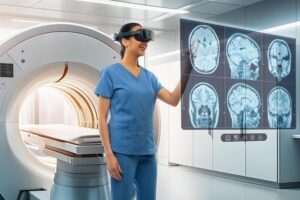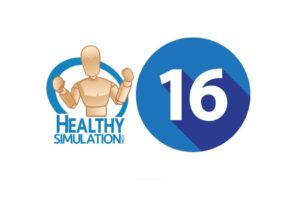EMS Competency Solution to Meet Nursing Education Competencies Needs
In alignment with other professional healthcare education programs, nursing education has transitioned to a more competency-based learning model of instruction that will rely heavily on clinical simulation. Education Management Solutions (EMS) has developed a competency-based solution and student tracking platform to aid nursing programs to track students and their performance towards obtaining competency. This HealthySimulation.com article will discuss how the EMS’ Competency solution can meet the nursing program’s need for a robust competency-based assessment.
Competency-Based Education
Professional nursing education has begun the transition to competency-based education following many other healthcare professional educations. Nursing is not alone in the development and revision of healthcare competencies. The Accreditation Council for Graduate Medical Education (ACGME) has six core competency-based milestones to assess and guide learning that includes medical knowledge, patient care, medical knowledge, professionalism, problem-based learning and improvement, interpersonal communication skills, professionalism, and systems-based practice. In 2022, ACGME and the American Association of Colleges of Osteopathic Medicine developed undergraduate medical competencies.
Sponsored Content:
The American Association of Colleges of Nursing (AACN) Essentials has revised and added new competencies, which guide curricular development across professional nursing programs at the undergraduate and graduate levels. There are eight core competencies essential for nurses practicing in a variety of care settings. The AACN revised the Essentials to include new competencies, such as population health and palliative care, and to promote increased focus on diversity and equity in nursing education.
Cole (2023) identified three recurring factors related to undergraduate nursing simulation competency-based evaluation: theoretical foundations, objective faculty outcome measurements, and tool development. This study shows the need for valid and reliable evaluation metrics, rubrics, and outcomes.
There is growing evidence that practitioners who engage in competency-based learning models during their healthcare education have demonstrated a dramatic reduction in medical errors that can lead to better patient health outcomes. Competency-based learning requires educators to track and measure core competencies across an entire healthcare curriculum, which can span multiple years of study and incorporates an ever-growing list of required knowledge and skills.
Entrustable Professional Activities and Clinical Simulation
Sponsored Content:
Once competencies have been developed, how do educators evaluate if the students have met the competencies? Entrustable Professional Activities (EPAs) are core competencies, sub-competencies, and milestones that define the core professional work of a particular field or discipline. More specifically, EPAs identify the individual skills, information, and behaviors that healthcare students must deliver in a reliable and trustworthy fashion in real-world practice. Medical education has used EPAs for years. Now, professional nursing education should consider the development of EPAs with the new core competencies.
With the adoption of competency-based learning, traditional assessments, mostly knowledge-oriented and rooted in teacher-centered methodologies, will have to change. Conventional testing methods cannot provide a comprehensive view of student success and their level of learning. This is where healthcare clinical simulation plays an essential role in competency-based assessment and curriculum solutions.
Simulation is an effective methodology for evaluating competencies and EPAs. Herrigel et al. (2020) found simulations are an effective method of providing formative assessment of EPAs that are exceptionally well-received by medical students. The researchers reflect that deliberate practice and longitudinal formative assessment are paramount to effectively develop core EPAs before final entrustment decisions. In nursing, Keddington and Moore (2019) evaluated simulation as a competency assessment method among healthcare professionals in a systematic review. The systematic review indicates that simulation may be a safe and effective competency assessment method for health care professionals. The review suggests that simulation was effective as a competency assessment method; however, further research should be conducted to provide conclusive evidence of benefits.
EMS and Competency Tracking
EMS addresses EPA assessment and tracking of learner performance with their Competency platform, with a focus on how to highlight measurable improvements in the gap between student performance and program expectations. Using powerful artificial intelligence to map core competencies to curriculum, Competency tracks longitudinal student performance and provides progress snapshots across key EPAs. The Competency management platform offers easy-to-use tools to assess their curriculum, manage competency sets, and track learner progression for healthcare education students. Built-in rubrics and assessment tools, including quizzes, further enhance student assessment.
More About Compentency.AI
EMS’ Competency solution provides educators with a unique, effective solution that aligns target outcomes across the curriculum. A centralized and secure cloud-based framework allows the platform to ensure program outcomes are linearly mapped with course objectives, assessment protocols, and accreditation requirements. Additionally, advanced data reporting and analytic features enable educators to track learner performance across the curriculum. Simulation educators can also monitor assessment accreditation criteria and analyze risk factors with advanced gap analysis tools. Competency’s innovative, AI-driven technology has enabled educators at institutions like Thomas Jefferson University Sidney Kimmel School of Medicine to train the next generation of practitioners effectively. Competency supports integrated competency gap analysis, making it possible to spot curriculum gaps, identify at-risk students early on, and ensure entering residents are ready.
In April 2023, The Accreditation Council for Education in Nutrition and Dietetics (ASCEND) adopted EMS’ Competency solution to connect and analyze competency-based performance data for curriculum assessment and student performance tracking. “[Competency] was highly recommended by another accreditor, and we were pleased with the features offered,” said Rayane AbuSabha, Executive Director for ACEND. “The software is a great value and will provide a quality, comprehensive system for our programs. The EMS team is passionate about their product and providing the best service for ACEND-accredited programs.” “We are delighted to partner with ACEND and support such a critical national program,” said Education Management Solutions CEO Matt Merino. He continued, “ACEND’s partnership positions EMS at the forefront of competency tracking solutions as we continue to focus on providing best-in-class solutions and services to our enterprise clients.”
Competency allows educational and institutional programs to:
- Simplify Curriculum Development: Automate curriculum mapping to competency-based parameters, perform comprehensive gap analysis and enhance holistic program assessment.
- Manage Rotations, Preceptors, and Sites: Access a central digital data repository, skills checklists, scheduling and site management, and patient encounters and assessment tracking.
- Track Student Progress Longitudinally: Consolidate multisource data, map competency-based progressions, and track EPAs to meet accreditation requirements and train skilled practitioners.
- Obtain Deliverable Data for Accreditors: Centrally track, analyze, and export competency-based deliverable data and easily share with accreditors to keep programs compliant with the most current clinical evaluation mandates.
View the HealthySimulation.com LEARN CE/CME Platform Webinar Leveraging Clinical Simulation Environments for Immersive Life-Long Clinical Learning to learn more!
More About Education Management Solutions (EMS)
Education Management Solutions merges essential information across environments, helping organizations align performance and capabilities between education, training, and active provider care. Seamlessly connecting and analyzing competency-based performance data for curriculum assessment and student performance tracking, EMS’ open architecture removes silos across OEM hardware, simulation training tools, video conferencing, and learning management systems. Fusing performance observations and measurements across immersive reality, hands-on education, and classroom instruction; EMS stays true to its core mission, integrated solutions, and elevated healthcare.
Learn More About Education Management Solutions!
Teresa Gore, PhD, DNP, APRN, FNP-BC, CHSE-A, FSSH, FAAN – Dr. Gore has experience in educating future nurses in the undergraduate and graduate nursing programs. Dr. Gore has a PhD in Adult Education, a DNP as a family nurse practitioner, and a certificate in Simulation Education. Dr. Gore is an innovative, compassionate educator and an expert in the field of healthcare simulation. In 2007l Teresa started her journey in healthcare simulation. She is involved in INACSL and SSH. She is a Past-President of INACSL and is a Certified Healthcare Simulation Educator Advanced (CHSE-A). In 2018, she was inducted as a Fellow in the American Academy of Nursing (FAAN). In 2021, she was inducted as a Fellow in the Society of Simulation in Healthcare Academy (FSSH) and selected as a Visionary Leader University of Alabama at Birmingham School of Nursing Alumni. During her career, Dr. Gore has led in the development and integration of simulation into all undergraduate clinical courses and started an OSCE program for APRN students. Her research interests and scholarly work focus on simulation, online course development and faculty development. She has numerous invited presentations nationally and internationally on simulation topics.
Sponsored Content:



















